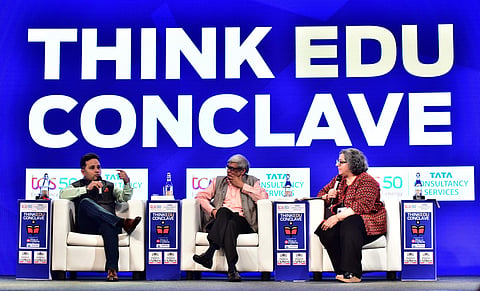

Bestselling author Amish Tripathi, best known for his Shiva trilogy, hit out at the colonial hangover that persists in the Indian Education system while speaking at the ThinkEdu Conclave. He was in conversation with author and economist Bibek Debroy and senior journalist Kaveere Bamzai about whether Lessons from our Epics needed to be in our curriculum.
Narrating an example from his childhood where he was told to shut up for questioning the sacrosanct four season system that is still taught in most schools. “The teacher said we have four seasons - Spring, Summer, Fall and Winter and I was asked to shut up when I asked about the monsoons that I could see,” Tripathi said. Tripathi pointed out that our ancestors named the year - Varsha - after the rain. “Such is the importance of rain to our country but now we aren't teaching our children about monsoons,” he said.
Refusing to dismiss this as a harmless one-off case, Amish Tripathi pointed out real-world effects of the colonial hangover such as Indian architects’ newfound affinity for glass buildings. “European architects use glass in buildings because they need to trap sunlight for heat. But there is a lot of sunlight in the country and there isn't a necessity for glass buildings,” he said, claiming our urban structures don't account for monsoons.
Renowned economist Bibek Debroy, chairman of the Economic Advisory Council to the Prime Minister, who also took part in this panel discussion on whether lessons from epics should find their way into textbooks and concurred with Amish Tripathi's views on the existing educational system severing students’ cultural roots.
Debroy said lessons from epics should find a place in school books because children are not reading them anymore. “Today, we have a generation who don't read any version (of epics) unless it's in English and they find it on social media,” he said, citing examples of how sometimes meanings are lost in translations.
Debroy, who urged the younger generations to learn Sanskrit. “I learnt Sanskrit when I was 40 years old and it I regret it because it's too late,” he said, joining Tripathi is highlighting the volume of knowledge available from the time of the epics.
In addition to the massive knowledge trove available from the epics, citing examples such as Arthashastra for its insights into economics and Bhaskara's Leelavathi which explains mathematical concepts, the panelists agreed that the Indian texts cater to the development of the left and right brain.
“Our texts combine poetry with concepts and this caters to development of the creative and logical sides of the brain,” said Tripathi, pointing out how children are burdened with only logical development of their brains.
